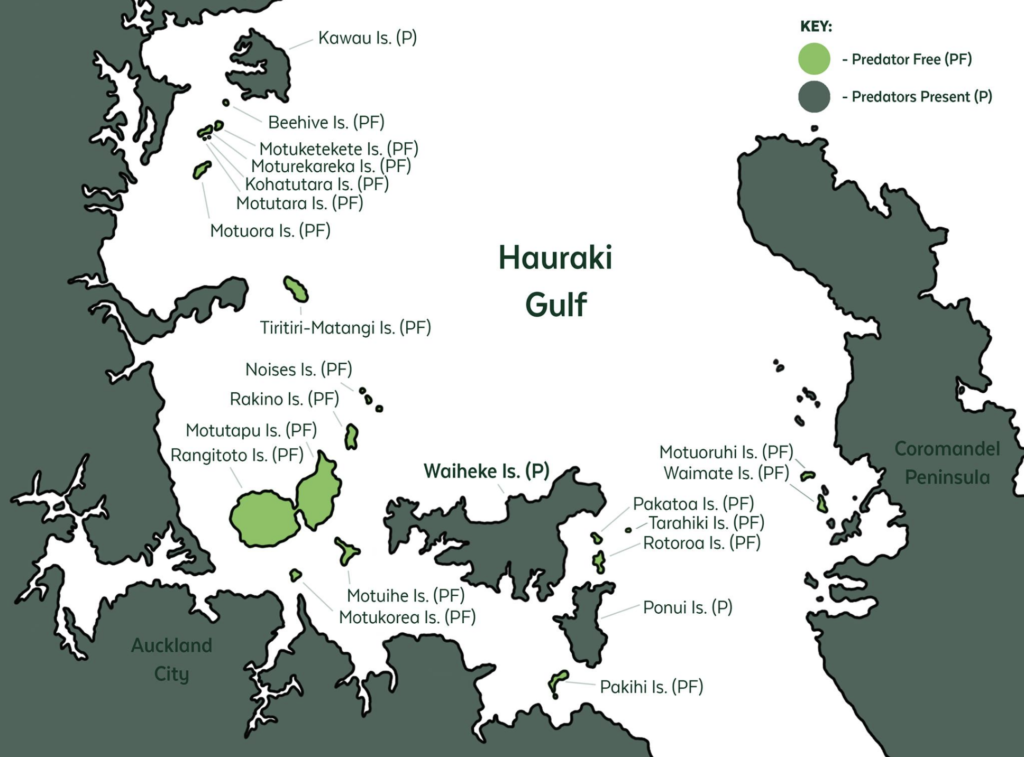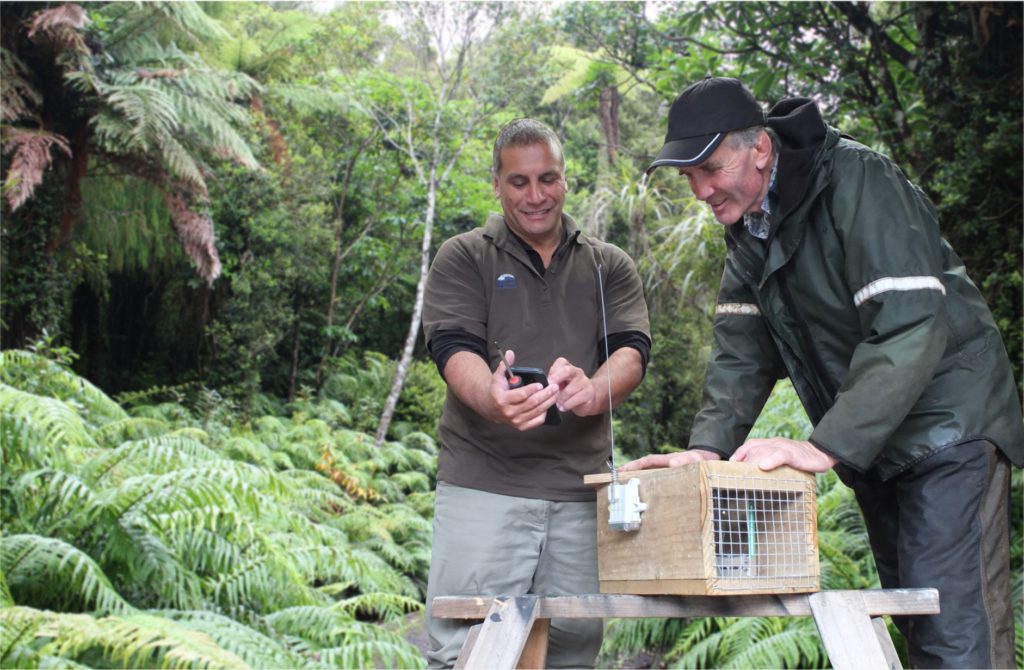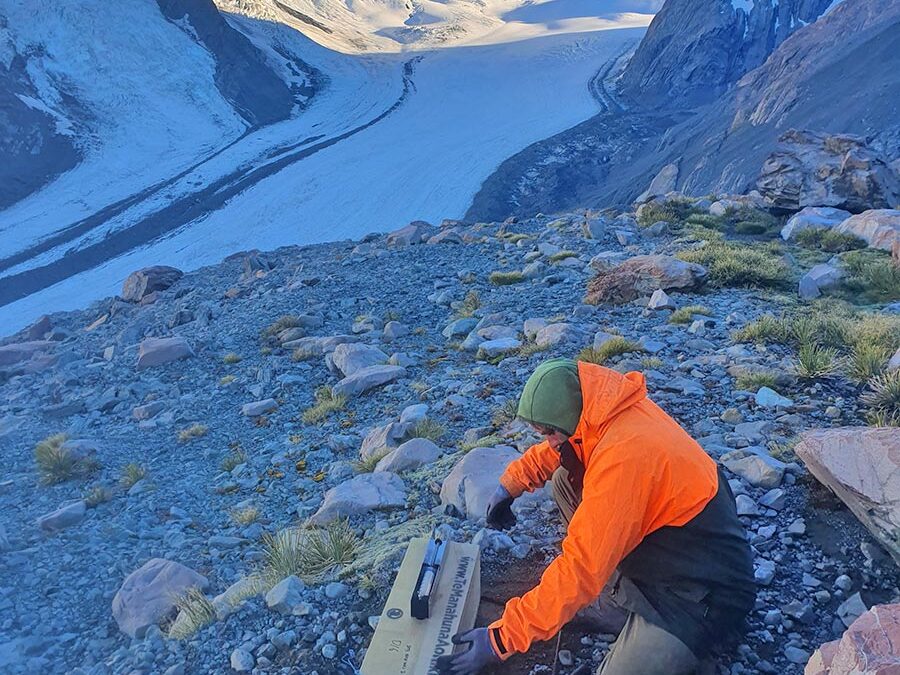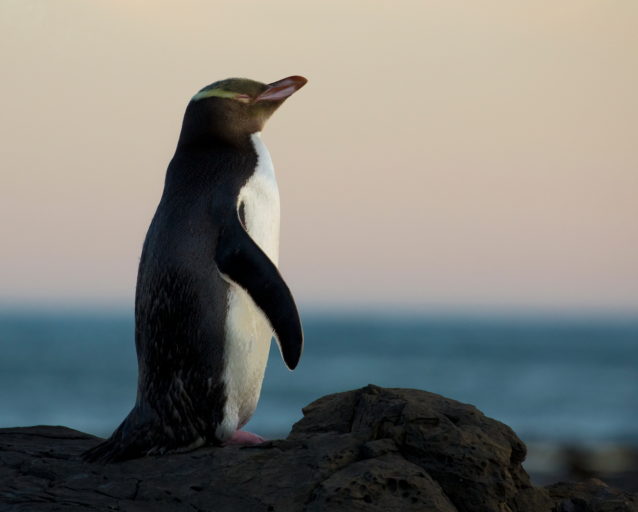ON THIS PAGE
None of this work can be done by a single organisation. Instead, it’s the work of many: DOC, volunteers, communities, iwi, hapu, conservation organisations, councils and more.
Auckland
Pest Free Auckland, run by Auckland Council, is a conservation initiative to help native species flourish free from introduced animals, plants, pathogens and marine pests.
Their predator free initiatives include Pest Free Hauraki Gulf, focusing on islands in the gulf and Te Korowai o Waikehe – Predator Free Waiheke, a programme to remove stoats and rats and become the world’s first predator free urban island. Tū Mai Taonga is a project working on Aotea (Great Barrier) to remove feral cats and rats from the island.
Whakatāne

Korehāhā Whakahau is removing possums from around Whakatāne, led by Te Rūnanga o Ngāti Awa. An important aspect of this project is creating opportunities for local iwi and hapū to increase capability and participation in the biodiversity/biosecurity sector.
Hawkes Bay
Predator Free Hawke’s Bay comprises three restoration projects that bring together community and landowner conservation efforts to enhance native biodiversity. Poutiri Ao ō Tāne is focused on predator control in the Maungaharuru Range. Cape to City covers 26,000 hectares of farmland and forest remnants. Whakatipu Mahia targets possum removal from 14,600 hectares of farmland on the Mahia Peninsula. It also addresses feral cats and mustelids.
Taranaki

Two large-scale projects have come together in the Taranaki region to make the whole region predator free. The combined area for these projects is an impressive 700,000 hectares. Taranaki Mounga collaborates with various organisations, and it aims to remove introduced predators like rats, stoats, and possums from a slice of Egmont National Park. Taranaki Taku Tūranga – Towards Predator-Free Taranaki has three different work streams – rural, urban and Restore Kaitake. A core part of the work has been creating a “virtual barrier” at Puketi, on the slopes of Mt Taranaki, to prevent the reinvasion of possums.
Wellington
Wellington intends to be the world’s first predator free capital city, and it is off to a good start. Predator Free Wellington is a ten-year project to free the city rats, possums and mustelids. Capital Kiwi is a project to bring kiwi back to the capital. It encompasses the southwestern corner of the North Island, involving farmers, businesses, landowners, schools and communities to work a network of stoat traps and reintroduce kiwi.
Te Manahuna Aoraki
Te Manahuna Aoraki is a project restoring the iconic natural landscapes and threatened species of the upper Mackenzie Basin and Aoraki/Mt Cook National Park. The project stretches across 310,000 hectares of both public and private land, including braided river systems and alpine habitats to secure a safe habitat for endangered species such as kea and tuke (rock wren), ngutu pare (wrybill), robust grasshoppers, skinks and scree wētā, the yellow alpine buttercup, and more.
Banks Peninsula
The Pest Free Banks Peninsula project brings together 14 organisations bound together by a vision to make the 110,000ha peninsula predator free.

South Westland
Predator Free South Westland aims to eliminate possums, rats and stoats from a 100,000-hectare area bounded by the Whataroa and Waiau (Waiho) Rivers, the Southern Alps and Tasman Sea.

Dunedin
Predator Free Dunedin forms an umbrella organisation for over 20 well-established Dunedin volunteer groups and larger organisations to protect native biodiversity and strengthen communities. The Otago Peninsula is the only mainland breeding colony in the world of the toroa (northern royal albatross), hoiho (yellow-eyed penguin) and koroā (little blue penguin).
Rakiura (Stewart Island)
Predator Free Rakiura is an ambitious project to remove rats, possums, feral cats and hedgehogs from Rakiura (Stewart Island) and its islands.
Maukahuka (Auckland Island)
Maukahuka (Auckland Island), in the New Zealand subantarctic islands, is the last remaining island in the region with introduced predators. Feral pigs, cats and mice roam the 57,000-hectare island, threatening unique species found nowhere else, including albatross, penguins and sea lions. The project Restoring Auckland Island is open for donations.

